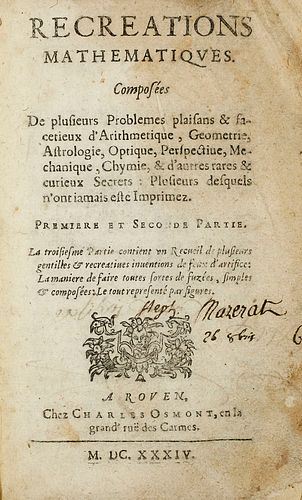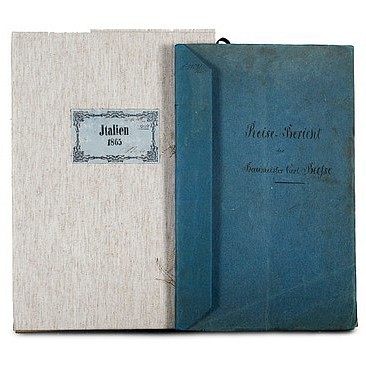Appier-Hanzelet, Jean (Jean Leurechon (1591-1670) zugeschrieben) Recreations Mathématiques Composées de Plusieurs Problèmes Plaisans & Facetieux d'Ari
Lot 1493
Categories
Absentee vs Live bid
Two ways to bid:
- Leave a max absentee bid and the platform will bid on your behalf up to your maximum bid during the live auction.
- Bid live during the auction and your bids will be submitted real-time to the auctioneer.
Bid Increments
| Price | Bid Increment |
|---|---|
| EUR€0 | EUR€10 |
| EUR€100 | EUR€10 |
| EUR€200 | EUR€20 |
| EUR€300 | EUR€30 |
| EUR€420 | EUR€30 |
| EUR€480 | EUR€20 |
| EUR€500 | EUR€50 |
| EUR€2,000 | EUR€200 |
| EUR€3,200 | EUR€300 |
About Auction
By Jeschke Jádi Auctions Berlin GmbH
Jul 31, 2021
Set Reminder
2021-07-31 06:00:00
2021-07-31 06:00:00
America/New_York
Bidsquare
Bidsquare : Rare Books, Prints, Historical Photography (Auction 138, Session 2)
https://www.bidsquare.com/auctions/jeschke-van-vliet/rare-books-prints-historical-photography-auction-138-session-2-7234
Session 2: Lot 882-1765 Jeschke Jádi Auctions Berlin GmbH info@jvv-berlin.de
Session 2: Lot 882-1765 Jeschke Jádi Auctions Berlin GmbH info@jvv-berlin.de
- Lot Description
Mathematik Appier-Hanzelet, Jean (Jean Leurechon (1591-1670) zugeschrieben) Recreations Mathématiques Composées de Plusieurs Problèmes Plaisans & Facetieux d'Arithmetique, Geometrie, Astrologie, Optique, Perspective, Mechanique, Chymie, & d'autres Rares & Curieux Secrets. Mit über 70 Textholzschnitten. 3 Tle. in 1 Bd. Rouen, Osmont, 1634. 2 Bll., 220 S., 2, Bll. 72 S., 7 Bll. 2 Bll. 47 S., 1 Bl. 8°. Prgt. (etwas berieben und fleckig). With over 70 text woodcuts. First published in 1624 (only 3 surviving copies of this edition are known), this is one of the earliest editions of the first book to postulate the idea of applied mathematics. It is in this book that the idea of the telegraph is first found (Problème 65). - The third part on fireworks is attributed to Jean Appier Hanzelet. Richly illustrated. Somewhat browned and spotted. Very rare. "Erstmals im Jahre 1624 veröffentlicht (nur 3 erhaltene Exemplare dieser Ausgabe sind bekannt), ist dies eine der frühesten Ausgaben des ersten Buches, das die Idee der angewandten Mathematik postuliert. In diesem Buch findet sich erstmals die Idee des Telegraphen (Problème 65 : Le moyen de faire un instrument qui face ouyr de loing, & bien clair : comme les lunettes de Galilée font voir de loing & bien gros). ""This work is pivotal in the history of science and mathematics. It brings together two sixteenth-century traditions, mercantile arithmetic and natural magic, and creates two new ones: recreational mathematics and popular science ... The book was influential on early seventeenth-century natural philosophers such as Descartes, Mersenne and Leibniz"" (A. Heeffer, Récréations Mathématiques (1624): A Study on its Authorship, Sources and Influence (Ghent, 2006). - Der dritte Teil, der dem Feuerwerk gewidmet ist, wird im Allgemeinen Jean Appier Hanzelet zugeschrieben. Reich illustriert. Etwas gebräunt und fleckig. Sehr selten."
- Buyer's Premium



 EUR
EUR CAD
CAD AUD
AUD GBP
GBP MXN
MXN HKD
HKD CNY
CNY MYR
MYR SEK
SEK SGD
SGD CHF
CHF THB
THB












